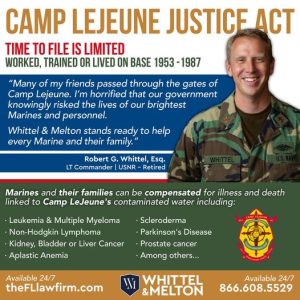Lonnie Kilpatrick is the namesake for the Lonnie Kilpatrick Central Pacific Relief Act, a man who has a disturbing story of missed diagnoses and a denial of benefits that outlived him.
Kilpatrick served in Guam where toxic herbicide was sprayed during the Vietnam War. He went from being diagnosed with osteoarthritis to having metastasized bone cancer all over his body, resulting in his death shortly after a heartbreaking interview pleading for Congress to take action 2018.
His nudge to Congress for help is what lead to the elements that were incorporated into the Sergeant First Class Heath Robinson Honoring our Promise to Address Comprehensive Toxics Act of 2022.
This is also known as the Pact Act, which was signed into law by President Joe Biden on August 10, 2022.
The Pact Act expands coverage to veteran service members and their families exposed to toxic water at Camp Lejeune. Likewise, 23 additional conditions caused by burn pit exposure will be covered under the law that also added six new Agent Orange exposure areas – Guam, Thailand, Cambodia, Laos, American Samoa and Johnston Atoll.
 While the Camp Lejeune Justice Act of 2022 is just one part of the comprehensive PACT Act, this new law focuses on providing monetary relief to those service members and their families that suffered four decades of contaminated water exposure at Camp Lejeune Marine Corps base in North Carolina.
While the Camp Lejeune Justice Act of 2022 is just one part of the comprehensive PACT Act, this new law focuses on providing monetary relief to those service members and their families that suffered four decades of contaminated water exposure at Camp Lejeune Marine Corps base in North Carolina.
There is now a two-year window of time from the date of signing (8/10/2022) for those who suffered harm from the toxic Camp Lejeune water to pursue financial compensation through a lawsuit filed only with the United States District Court for the Eastern District of North Carolina.
This new opportunity for legal action can help all those affected by the contaminated Camp Lejeune water to recover disability benefits, medical expenses, lost wages, counseling and other mental health services, and pain and suffering.
If you are suffering from any of the following or lost a loved one who suffered from any of the following medical conditions, you should explore your options for pursuing legal action:
- Internal organ damage
- Renal toxicity
- Multiple myeloma
- Myelodysplastic syndromes
- Hepatic steatosis
- Scleroderma
- Cardiac Defects
- Tooth loss
- Tooth decay
- Bladder cancer
- Non-Hodgkin’s lymphoma
- Leukemia
- Lymphomas
- Esophageal cancer
- Kidney cancer
- Liver Cancer
- Lung cancer
- Cervical cancer
- Ovarian cancer
- Prostate cancer
- Rectal cancer
- Breast cancer
- Brain cancer
- Female infertility
- Miscarriage
- Still birth
- Neural tube defects
- Oral cleft defects (cleft lip)
- Low birth weight
- Childhood hematopoietic cancers
- Declining memory
- Difficulty concentrating
- Dementia
- Post-traumatic stress disorder (PTSD)
- Fatigue
- Poor motor functions
- Insomnia
- Parkinson’s Disease
- Hyperactivity
- Anxiety
- Fear of being injured
Now that the PACT Act has been signed into law, those who were stationed at or lived at Camp Lejeune between 1953 and 1987 for at least 30 days (consecutive or non-consecutive) may be eligible to file a lawsuit. Our Florida Camp Lejeune Lawsuit Lawyers at Whittel & Melton can review your potential claim for free today. If you think that you qualify for a financial award or benefits and you reside in the Tampa Bay area, please call us now at 813-221-3200 or contact us online for a free consultation.
 Tampa Bay Injury Attorney Blog
Tampa Bay Injury Attorney Blog










